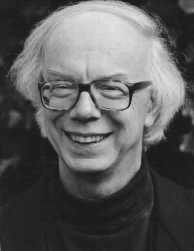2nd December 2004
- Johann Sebastian Bach
- Fantasia in G major
- Chorale preludes Nun komm' der Heiden Heiland and Vor deinen Thron
- Canonic Variations on Vom Himmel Hoch
- Passacaglia BWV 582
- Nicolas de Grigny From the Gloria of the Mass
- Franz Liszt Variations on Weinen, Klagen, Sorgen, Zagen, S.180
- Lionel Rogg Meditation on B.A.C.H. (2000)
 The great Swiss organist Lionel Rogg returned to the RFH organ after many years, and talked with Andrew McCrea in a pre-recital interview which was well structured and unfailingly fascinating. He is more concerned with 'intuition' and enjoyment than academic research, having no time for theory unless he finds it 'necessary' to himself as a performer.
The great Swiss organist Lionel Rogg returned to the RFH organ after many years, and talked with Andrew McCrea in a pre-recital interview which was well structured and unfailingly fascinating. He is more concerned with 'intuition' and enjoyment than academic research, having no time for theory unless he finds it 'necessary' to himself as a performer.
He no longer listens to his youthful recordings of Bach on the Metzler organ at Grossmunster, Zurich, which influenced a whole generation of British organists. They achieved remarkable sales that would be impossible nowadays, but Rogg now regards them as "just a snapshot" of his playing at the time.
Rogg found much of interest in Walcha's recordings, not on account of his interpretations of Bach, but because the historical organs fired his enthusiasm to continue his postgraduate studies in organ rather than piano. He particularly admired the Silbermann organ in Arlesheim, which he used for his second, stereo recording of the oeuvre; the instrument 'breathes' and the acoustic is ideal.
Lionel Rogg said that he admires the RFH's Ralph Downes/Harrison and Harrison organ. Despite its having an electrical action it is "not too brutal, a little vague, which I like". With "strength of will" you can make an organ sound as you wish.
He gave short shrift to current beliefs that Bach should be played non-legato, reminding us that Johann Sebastian had been rediscovered by 19th century romantics such as Mendelssohn. He demonstrated at the piano how Bach's suspensions create tension and have to be resolved legato, otherwise their meaning is destroyed. He relishes in his favourite composer "the endless succession of suspensions, like an endless stream (Bach means stream)".
About his own prolific composing, Lionel Rogg said that he has taught himself to compose in many styles, but "intuition is my guide". He has written an eclectic series of Hommages, including the Meditation on B.A.C.H. which he included in his recital before ending with the last of the Eighteen chorales. He develops his works from private improvisations (he does not improvise in concerts) and likes to combine strict counterpoint with freedom. He had transcribed Brahms and Bruckner (whose orchestral music sounds well on the organ) but is not greatly interested in the majority of 19th century organ composers. He worships J. S. Bach, but has been influenced also by Liszt.
In the recital which followed, Lionel Rogg selected registrations which were overall quieter than my frequent experience of the organ at the RFH. There was occasional instability of rhythm, but the effect of his playing as a whole was absorbing and it was a privilege to hear this famous veteran once again, vigorous and clearly in excellent health.
Peter Grahame Woolf
Lionel Rogg's discography can be found at www.lionelrogg.ch. His recording of J. S. Bach's Complete Organ Works played on the Silbermann organ in Arlesheim is available on Harmonia Mundi, HMX 2907283 (12cds).
